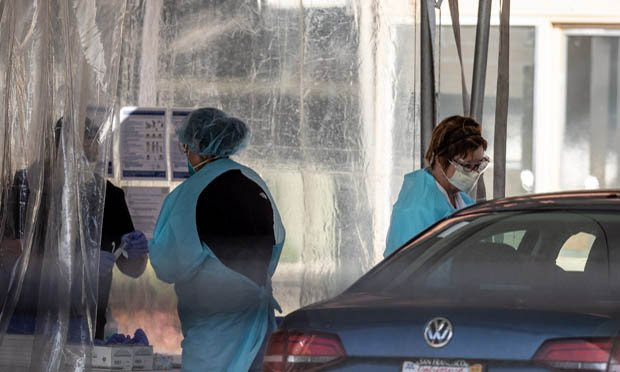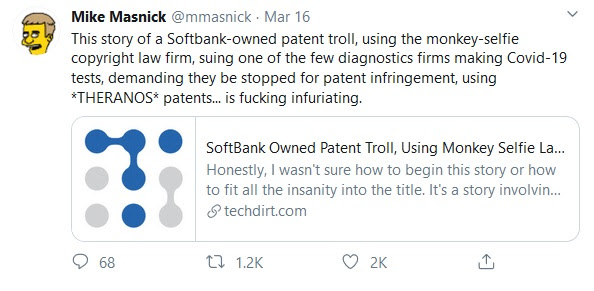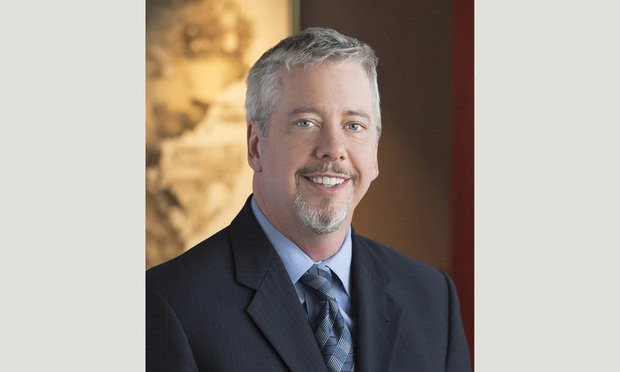Skilled in the Art: IP Community Braces for Social Distancing + More on the COVID-19 'Patent Troll'
The fallout from COVID-19 is landing on the IP community
March 17, 2020 at 07:30 AM
11 minute read
Welcome to Skilled in the Art. I'm Law.com IP reporter Scott Graham. The fallout from COVID-19 is landing on the IP community, and I have some reactions from lawyers on the front lines (though relevance arguably is changing hour by hour). Also, Techdirt's Mike Masnick has us all thinking about "patent trolls" again, though the narrative is a little more complex than at first blush. Plus, Sequenom has finally gotten some of its diagnostics patents—check that, "preparation patents"—through the Federal Circuit. Morgan Lewis has locked down a $268 million judgment. And the Fish & Neave reunion party continues at Maynard Cooper.
As always, you can email me your thoughts and follow me on Twitter.
 Kaiser Permanente medical staff test a patient for COVID-19 at a newly established drive-through facility in San Francisco. (Photo: Jason Doiy/ALM)
Kaiser Permanente medical staff test a patient for COVID-19 at a newly established drive-through facility in San Francisco. (Photo: Jason Doiy/ALM)Locking Down the IP Community
The PTO is closed to the public. The PTAB and the Federal Circuit are holding many hearings remotely. And all of the IP litigators in Silicon Valley have been told to shelter in place along with the rest of the San Francisco Bay Area, including the Northern District of California courts.
These changes are disrupting the business of IP law. A few practitioners contacted Monday said they're confident it can be managed in the short term, though they're hoping this isn't the start of a new normal.
Let's start with patent prosecution. Much of it is already done over the phone, Mintz, Levin, Cohn, Ferris, Glovsky and Popeo partner Terri Shieh-Newton noted. But when applicants and examiners reach impasse, applicants often request an in-person meeting with the examiner, the supervising examiner and occasionally PTO's Technology Quality Assurance. Sometimes the prosecuting attorney brings drawings or a 3-D model of the technology to make her point.
"Having those people sit in on your in-person interviews can be important," Shieh-Newton said. "That being said, it is still possible to do those by web conference. You'll just have to hold up your model" to the camera.
Closing the PTO's massive Alexandria, Virginia complex to the public temporarily strikes her as the right call. "There's just a lot of foot traffic in and out, so it does make sense in terms of the pandemic and limiting exposure," she said.
Eliot Williams, Baker Botts' IP department chair for Palo Alto, notes that many official communications from the PTO to patent applicants and owners still occur by snail mail. His firm employs people whose tasks include spotting such letters and ensuring they're routed to the intended recipient. "It's not clear if we'll be able to have anyone in the office to do that," he said Monday afternoon, a few hours after the Bay Area's shelter-in-place order was announced. "We're trying to figure out what we can do and what we need to do. Everybody is supportive of the idea of contributing to public health."
Williams has a series of oral hearings scheduled before the Patent Trial and Appeal Board next month. He wasn't sure as of Monday whether he'd be able to use the conferencing facility at the PTO's San Jose office or would be phoning in. Either way it won't be too much of a shock: He's participated in PTAB hearings where two of the three judges appeared via video remote. He's also participated telephonically in reexamination hearings. (Practice tip: When you hear one of the APJs unmute their microphone, that's your cue to stop talking so they can ask their question, Williams said.)
Depositions pose more of a challenge. The PTAB is required by law to decide validity challenges within a year, so there's usually not much leeway when it comes to discovery timelines. Williams had been scheduled to take a deposition Tuesday. The parties had agreed to a bare-bones crew—one lawyer for each side, the witness, and a reporter. "Then we got the notice that they want the whole Bay Area shut down," Williams said. As of Monday the parties were working on setting up a web conference that would allow the witness to testify from home. "Everyone will be in a different location," he said.
Terry Rea, the vice chair of Crowell & Moring's IP practice and former acting director of the PTO, said that having to conduct an oral hearing by telephone might be a big deal to an individual lawyer or client. But, she said, "I think these are difficult times and we're all doing the best we can. The guidelines they've provided are more than reasonable and I think the system will go on."
Finally, the Federal Circuit announced substantial changes last week to its April calendar. Those involving attorneys from outside the Washington area will be conducted telephonically. Those in which counsel are local are scheduled to be in person "as of now" (though it seems likely that might change as the hearing dates draw closer). Finally, the court has submitted some 38 cases on the briefs, or about half of its April calendar.
Traditionally, the court has promised every litigant represented by counsel the opportunity to present oral argument. That way, if the court issues a Rule 36 opinion summarily affirming the lower tribunal, the parties at least have a sense of the court's reasoning.
The steps the Federal Circuit are taking seem like the right thing to do under the extraordinary circumstances the nation is facing. I hope that the losers of the submitted cases will get at least a few paragraphs of explanation from the court, and that the court will restore its tradition of oral arguments once we're back to the old normal.

Fortress Is the New Intellectual Ventures
Mike Masnick's story at Techdirt about a Fortress Investment Group shell using Theranos-developed patents to sue a diagnostics company that's working on a COVID-19 test created a sensation Monday, and rightly so. If you wanted to create the most infuriating possible "patent troll" narrative, this one would be hard to top.
But a few other factors are worth considering. First, I think it was a low blow to refer to Irell & Manella as "the monkey selfie copyright law firm." That was a pro bono case led by an attorney no longer at the firm. This seems as relevant as describing Gibson, Dunn & Crutcher as "the asylum seeker law firm." More to the point, in the classical patent troll narrative, the troll and its lawyer are asserting weak patents in a quest for quick nuisance-value settlements worth less than the cost of litigation. Irell takes a lot of its patent cases all the way to trial, including three nine-figure verdicts in the last four months.
Second, as pointed out in Labrador Diagnostics' complaint, defendant BioFire isn't situated like a mom-and-pop coffee shop blindsided by an outrageous demand letter. BioFire parent bioMerieux is a $2.5 billion a year company that retained Williams & Connolly to bring its own infringement suit against Hologic over that company's HIV tests. Last month a jury found that all six of bioMerieux's asserted patent claims were invalid.
Third, Fluidigm and Wilson Sonsini Goodrich & Rosati (the Pelican Bay law firm) sued bioMerieux last year over the some of the same film array technology. BioMerieux, this time represented by Kirkland & Ellis, settled earlier this month.
Finally, as Masnick reported earlier today, Fortress/Labrador put out a statement Tuesday saying that when it filed its suit last week, it didn't know that BioFire was using the accused technology to develop a COVID-19 test. "When Labrador learned of this, it promptly wrote to the defendants offering to grant them a royalty-free license for such tests," the company said in the statement, adding that it "fully supports efforts to assess and ultimately end this pandemic."
Masnick is skeptical of what's meant by "an offer to grant" a license rather than an outright waiver of rights to COVID-19 tests. He also points out that we're still "talking about questionable patents from Theranos, a firm that was shown to be a sham, with technology that never worked."
If that's the case, it should be easy enough for bioMerieux to file an IPR and let the PTAB do its thing, or ask U.S. District Judge Maryellen Noreika to impose Rule 11 sanctions.
 Weil Gotshal's Ed Reines
Weil Gotshal's Ed ReinesIllumina Wins, Invents New Category of Patents
I have to admit I was skeptical. When Illumina and Sequenom appealed U.S. District Judge Susan Illston's decision finding ineligible two patents on a non-invasive test for fetal abnormalities, I saw a few obstacles. Number one, there's the general trend of diagnostics patents being held ineligible under the Supreme Court's Mayo/Alice test. Number two, there's the specific previous litigation between Ariosa Diagnostics and Sequenom that found Sequenom patents ineligible. And third, there's my general rule of thumb that Judge Illston usually gets things right.
But Illumina and its Weil, Gotshal & Manges counsel have pulled off the upset. On Tuesday the Federal Circuit ruled 2-1 that the asserted claims of Illumina's 9,580,751 and 9,738,931 patents pass muster under Section 101. "This is not a diagnostic case. And it is not a method of treatment case," Judge Alan Lourie wrote in Illumina v. Ariosa Diagnostics. "It is a method of preparation case."
Specifically, the inventions stem from the discovery that cell-free fetal DNA tends to be shorter than cell-free maternal DNA in a mother's bloodstream. The Federal Circuit said the claims aren't directed to that natural phenomenon, which would be ineligible, but to a method of selectively removing DNA fragments that are above a specified size threshold.
Judge Kimberly Moore concurred. Judge Jimmie Reyna, author of the previous Ariosa decision, dissented. "Whether the asserted claims recite a composition of matter or a 'method of preparation,' the purpose of Section 101 remains the same, to safeguard against claims that monopolize a law of nature, natural phenomenon, or abstract idea," Reyna wrote.
Weil Gotshal partner Ed Reines had the winning argument for Illumina and Sequenom. Durie Tangri represented Ariosa and Roche.
 Morgan Lewis partner Michael Lyons
Morgan Lewis partner Michael LyonsMorgan Lewis Sticks $268 Million Verdict
Morgan, Lewis & Bockius has locked down a $268 million damage award for willful infringement of two patents on implanted hearing aids. The Federal Circuit summarily affirmed a 2018 judgment in Alfred E. Mann Foundation for Scientific Research v. Cochlear on Monday, capping 12 years of litigation. (Actually, it's not over quite yet–still pending is the foundation's request for an additional $133 million in prejudgment interest).
Morgan Lewis partner Tom Peterson argued the appeal. Partner Michael Lyons, who's been helming the foundation's team for several years, said in an emailed statement that the Federal Circuit's "prompt affirmance is a watershed moment in this long-running dispute." Mayer Brown partner Donald Falk represented the foundation's licensee Advanced Bionics.
Finnegan, Henderson, Farabow, Garrett & Dunner represented Cochlear.
IP Lateral—Maynard Cooper
Maynard Cooper has added another Fish & Neave alum to its IP practice. Chris Harnett, most recently of Jones Day, joined as a partner earlier this month. Harnett has tried patent infringement and trade secret cases involving pharmaceuticals, biotechnology, medical devices, computer systems and consumer products.
"I can't tell you how thrilled we are to have him on board," Maynard Cooper's IP chief Sasha Rao said via email, noting that Harnett is coming off a bench trial win last month for Takeda Pharmaceutical. Harnett and his team defeated validity challenges to a DPP-IV inhibitor used to treat Type-2 diabetes, keeping two potential challengers off the market for eight more years.
Harnett and Rao practiced together at IP boutique Fish & Neave and after it was acquired by Ropes & Gray in 2005. Partners John Hintz, Kevin Culligan, John Hanish and of counsel W. Edward Bailey are among the other Fish & Neave alums at Maynard Cooper.
That's all from Skilled in the Art today. I'll see you all again on Friday. Stay safe out there!
This content has been archived. It is available through our partners, LexisNexis® and Bloomberg Law.
To view this content, please continue to their sites.
Not a Lexis Subscriber?
Subscribe Now
Not a Bloomberg Law Subscriber?
Subscribe Now
NOT FOR REPRINT
© 2025 ALM Global, LLC, All Rights Reserved. Request academic re-use from www.copyright.com. All other uses, submit a request to [email protected]. For more information visit Asset & Logo Licensing.
You Might Like
View All
Skilled in the Art With Scott Graham: I'm So Glad We Had This Time Together

Design Patent Appeal Splinters Federal Circuit Panel + Susman Scores $163M Jury Verdict + Finnegan Protects Under Armour's House
Law Firms Mentioned
Trending Stories
Who Got The Work
J. Brugh Lower of Gibbons has entered an appearance for industrial equipment supplier Devco Corporation in a pending trademark infringement lawsuit. The suit, accusing the defendant of selling knock-off Graco products, was filed Dec. 18 in New Jersey District Court by Rivkin Radler on behalf of Graco Inc. and Graco Minnesota. The case, assigned to U.S. District Judge Zahid N. Quraishi, is 3:24-cv-11294, Graco Inc. et al v. Devco Corporation.
Who Got The Work
Rebecca Maller-Stein and Kent A. Yalowitz of Arnold & Porter Kaye Scholer have entered their appearances for Hanaco Venture Capital and its executives, Lior Prosor and David Frankel, in a pending securities lawsuit. The action, filed on Dec. 24 in New York Southern District Court by Zell, Aron & Co. on behalf of Goldeneye Advisors, accuses the defendants of negligently and fraudulently managing the plaintiff's $1 million investment. The case, assigned to U.S. District Judge Vernon S. Broderick, is 1:24-cv-09918, Goldeneye Advisors, LLC v. Hanaco Venture Capital, Ltd. et al.
Who Got The Work
Attorneys from A&O Shearman has stepped in as defense counsel for Toronto-Dominion Bank and other defendants in a pending securities class action. The suit, filed Dec. 11 in New York Southern District Court by Bleichmar Fonti & Auld, accuses the defendants of concealing the bank's 'pervasive' deficiencies in regards to its compliance with the Bank Secrecy Act and the quality of its anti-money laundering controls. The case, assigned to U.S. District Judge Arun Subramanian, is 1:24-cv-09445, Gonzalez v. The Toronto-Dominion Bank et al.
Who Got The Work
Crown Castle International, a Pennsylvania company providing shared communications infrastructure, has turned to Luke D. Wolf of Gordon Rees Scully Mansukhani to fend off a pending breach-of-contract lawsuit. The court action, filed Nov. 25 in Michigan Eastern District Court by Hooper Hathaway PC on behalf of The Town Residences LLC, accuses Crown Castle of failing to transfer approximately $30,000 in utility payments from T-Mobile in breach of a roof-top lease and assignment agreement. The case, assigned to U.S. District Judge Susan K. Declercq, is 2:24-cv-13131, The Town Residences LLC v. T-Mobile US, Inc. et al.
Who Got The Work
Wilfred P. Coronato and Daniel M. Schwartz of McCarter & English have stepped in as defense counsel to Electrolux Home Products Inc. in a pending product liability lawsuit. The court action, filed Nov. 26 in New York Eastern District Court by Poulos Lopiccolo PC and Nagel Rice LLP on behalf of David Stern, alleges that the defendant's refrigerators’ drawers and shelving repeatedly break and fall apart within months after purchase. The case, assigned to U.S. District Judge Joan M. Azrack, is 2:24-cv-08204, Stern v. Electrolux Home Products, Inc.
Featured Firms
Law Offices of Gary Martin Hays & Associates, P.C.
(470) 294-1674
Law Offices of Mark E. Salomone
(857) 444-6468
Smith & Hassler
(713) 739-1250










